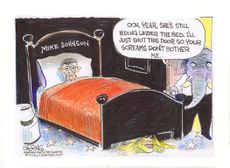Why split-ticket voting is a recipe for what everyone hates most about D.C.
If you vote to ensure that a Republican Congress faces President Clinton, you forfeit your ability to complain about gridlock


In Senate and House races all over the country, Republican candidates are telling voters that Donald Trump is not going to be president. Vote for me, they say, so I can be "a check" on the next president, whoever it might be (wink wink). They're warning against the dangers of a "blank check" for Hillary Clinton that might come from electing Democrats for Congress. Or as John McCain says, "If Hillary Clinton is elected president, Arizona will need a senator who will act as a check, not a rubber stamp, for the White House."
Which might sound reasonable. Who wants to be represented by a rubber stamp? And this is what we're going to hear from every Republican who has rejected Trump or somehow avoided endorsing him: Go ahead and vote for Clinton, but split your ticket to vote for me, too.
The problem is that ticket-splitting is a recipe for everything people say they hate about Washington.
Subscribe to The Week
Escape your echo chamber. Get the facts behind the news, plus analysis from multiple perspectives.

Sign up for The Week's Free Newsletters
From our morning news briefing to a weekly Good News Newsletter, get the best of The Week delivered directly to your inbox.
From our morning news briefing to a weekly Good News Newsletter, get the best of The Week delivered directly to your inbox.
Let's think about what that "check" on Clinton might be. If we were in a different era — or even if we were contemplating a Republican president and a Democratic Congress — it would mean what people say, that with our senator keeping an eye on things, the president won't get out of control with some highly ideological agenda. He or she will have to stick to practical proposals with wide support. Divided government would slow things down and make for more deliberative legislating, one where compromise is necessary to accomplish anything.
But today's Republican Party has a much different idea of what it means to keep a Democratic president in check. As we've seen in the last eight years, they believe that with only the occasional, very rare exception, their job is to stop everything a Democratic president wants to do. They've made it standard practice to filibuster every bill of any consequence whatsoever, and if Barack Obama wants it, they're going to do everything in their power to prevent it from happening. There are no compromises, no working across the aisle — and everyone who voted for a Republican Congress in 2010 and 2014 knew that's exactly what they'd get. There's no reason to think they'll act any differently under President Hillary Clinton if they maintain a majority in one or both houses.
So if you're voting for a Republican Congress, you're voting for gridlock. It's as simple as that.
Now, there are some people who might say there's nothing wrong with that. If you're a conservative and you think Trump would be a nightmare but you don't want to see Democratic policies enacted, then gridlock may be okay with you — or at least it would be preferable to the alternatives. But the idea that a Republican Congress would be a "check" on the president, as people like McCain are telling voters, is bogus. It's not a check, it's a roadblock.
This year's plea for ticket-splitting is notable because it has become so rare. As the two parties have grown more ideologically distinct, with the disappearance of both conservative Democrats and liberal Republicans, voters have had less reason to vote for presidents and legislators from different parties. In 2012, only 26 out of 435 House districts voted for one party's candidate for president and the other party's candidate for Congress. But Donald Trump's candidacy has brought the possibility back, and Republicans are encouraging it; in Ohio, Republican Sen. Rob Portman's campaign has even gone to Clinton rallies to pass out flyers in the hopes of convincing voters to become ticket splitters.
But anyone thinking of splitting their ticket should do so with open eyes. If you vote to ensure that a Republican Congress faces President Clinton, you've forfeited your ability to complain about gridlock, or say that "Washington can't get anything done," or whine that politicians have mucked everything up and what we need are outsiders who'll apply common sense, or repeat any of the other bogus clichés Republicans have been feeding their constituents for years.
The problem isn't that "Washington" can't get anything done these days, it's that we have a Democratic president that Republicans have sworn to oppose in all things. We may wind up with exactly the same thing after November's election. But if that's what you voted for, you don't get to complain.
Create an account with the same email registered to your subscription to unlock access.
Sign up for Today's Best Articles in your inbox
A free daily email with the biggest news stories of the day – and the best features from TheWeek.com
Paul Waldman is a senior writer with The American Prospect magazine and a blogger for The Washington Post. His writing has appeared in dozens of newspapers, magazines, and web sites, and he is the author or co-author of four books on media and politics.
-
 5 rambunctious cartoons about the House speakership standoff
5 rambunctious cartoons about the House speakership standoffCartoons Artists take on Mike Johnson's night terrors, the Speaker's chair, and more
By The Week US Published
-
 The Week Unwrapped: Ultrarunning, menswear and a meaty row
The Week Unwrapped: Ultrarunning, menswear and a meaty rowPodcast Is the "Hardest Geezer" a high-endurance trendsetter? Will Ted Baker survive? And what's the beef with lab-grown meat?
By The Week Staff Published
-
 Crossword: April 14, 2024
Crossword: April 14, 2024The Week's daily crossword
By The Week Staff Published
-
 Arizona court reinstates 1864 abortion ban
Arizona court reinstates 1864 abortion banSpeed Read The law makes all abortions illegal in the state except to save the mother's life
By Rafi Schwartz, The Week US Published
-
 Trump, billions richer, is selling Bibles
Trump, billions richer, is selling BiblesSpeed Read The former president is hawking a $60 "God Bless the USA Bible"
By Peter Weber, The Week US Published
-
 The debate about Biden's age and mental fitness
The debate about Biden's age and mental fitnessIn Depth Some critics argue Biden is too old to run again. Does the argument have merit?
By Grayson Quay Published
-
 How would a second Trump presidency affect Britain?
How would a second Trump presidency affect Britain?Today's Big Question Re-election of Republican frontrunner could threaten UK security, warns former head of secret service
By Harriet Marsden, The Week UK Published
-
 'Rwanda plan is less a deterrent and more a bluff'
'Rwanda plan is less a deterrent and more a bluff'Instant Opinion Opinion, comment and editorials of the day
By The Week UK Published
-
 Henry Kissinger dies aged 100: a complicated legacy?
Henry Kissinger dies aged 100: a complicated legacy?Talking Point Top US diplomat and Nobel Peace Prize winner remembered as both foreign policy genius and war criminal
By Harriet Marsden, The Week UK Last updated
-
 Trump’s rhetoric: a shift to 'straight-up Nazi talk'
Trump’s rhetoric: a shift to 'straight-up Nazi talk'Why everyone's talking about Would-be president's sinister language is backed by an incendiary policy agenda, say commentators
By The Week UK Published
-
 More covfefe: is the world ready for a second Donald Trump presidency?
More covfefe: is the world ready for a second Donald Trump presidency?Today's Big Question Republican's re-election would be a 'nightmare' scenario for Europe, Ukraine and the West
By Sorcha Bradley, The Week UK Published